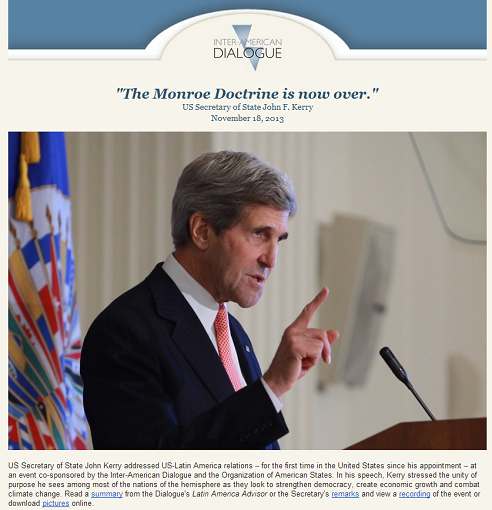November 19, 2013
Yesterday, Secretary of State John Kerry gave a major address at the Organization of American States on U.S. foreign policy in the Western Hemisphere and, despite all evidence to the contrary, he continued to describe the relationship between the U.S. and Latin America as a partnership between “equal partners.” Kerry did not reveal any new policy changes, and his talk contained few specifics, but we can still take time to appreciate some of the contradictions in his statements.
First of all, it seems abundantly clear that the U.S. does not treat any country as its equal, especially not any Latin American country. This has been proven recently by the Obama administration’s disregard for “collateral damage” in the war on drugs and its support for the Cuba embargo despite opposition from all of the countries in Latin America, indeed all the world’s countries except Israel recently voted against the embargo at the U.N. Other examples are not hard to find.
Second, Kerry continued the U.S.’s half-acknowledgement of espionage targeting foreign citizens, leaders and companies. He incorrectly placed Latin American countries on the same side as the U.S. when he referred to “understandable concerns around the surveillance disclosures.” Actually, Edward Snowden and Glenn Greenwald have received praise for their work around U.S. government transparency – their disclosures are credited with having brought to light an issue of vital importance for international trade, sovereignty and human rights. The “understandable concerns” are about the surveillance itself. The postponement of Brazilian President Dilma Rousseff’s state visit was only the culmination of a long series of failures on the part of the U.S. government to offer an acceptable explanation or apology.
In his speech, Kerry called for unity around a “new energy market” to combat climate change, but U.S. espionage has extended to Petrobras, Brazil’s major oil company which is partially owned by the state. To summarize the state of affairs: the U.S. State Department is calling for unity among “equal partners” to confront climate change in the energy market, even though the U.S. (1) is the largest contributor to climate change after China and (2) has recently committed economic espionage against the largest energy company in Latin America. It is therefore hard to take these remarks seriously.
The sound bite that seems to have received the most attention was Kerry’s reference to the Monroe Doctrine, stating that the U.S. has abandoned this policy. After assuring his audience that this is “not a bad thing,” he received applause. Perhaps we can encourage the State Department to select a more ambitious standard by which to judge its role in the region, one that isn’t almost 200 years old, but Kerry also signaled that this is mere rhetoric by attacking Venezuela – where he said “democratic institutions [we]re weakened,” “recently” in the same speech, without elaborating.
An email sent out by the Inter-American Dialogue misquoted Kerry as saying, “The Monroe Doctrine is now over.” Of course, this is not really the point. The fact that the U.S. government had abandoned this rhetoric can be seen in the surprise and insult felt by many when Kerry slipped, invoking the doctrine when he referred to Latin America as the U.S.’s “backyard.” That was a bit off message. The real news is that while the window dressing has changed, much of the substance of U.S. foreign policy in the region has not.







